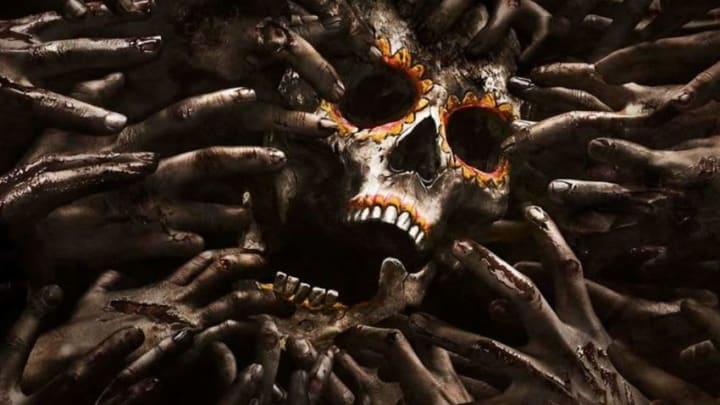Day of the Dead and cultural view of death seem to feature prominently in the new season of Fear the Walking Dead as the group has landed in Mexico.
As we watch Fear the Walking Dead, we have started to see an interesting exploration of cultural differences on views of death and how they might affect people in the setting of the zombie apocalypse.
As a former Spanish teacher, the Mexican culture, Day of the Dead imagery and distinct artistic and personal relationship with death for the Mexican people, has been a tremendously interesting aspect of Fear the Walking Dead.
It’s a fascinating topic that is often misunderstood. Many students and parents upon hearing the words Day of the Dead mistakenly thought it was worship of the dead or was sacrilegious, disrespectful or morbid in nature.
The Mexican culture is uniquely religious, superstitious and respectful in a combination that isn’t seen in the same way in other places. Day of the Dead is not devil worship. As I told my students and parents when we spoke about culture, we were expected to have reactions to it because it was different, but we were learning about it, not learning to believe in it.
Related Story: Day of the Dead Art and Zombies
This morning I watched an episode of Murder, She Wrote that happened to have a Day of the Dead theme, which was serendipitous on this premiere day for Fear the Walking Dead. One of the characters said a simple line that made me grab my laptop and start typing. She said she was preparing to “celebrate the death that comes to us all”
That made me think of Day of the Dead in a new way that was really a way that I already understood, but the simplicity of her words struck me related to Fear the Walking Dead. Perhaps that is what Celia was doing. Trying to face death. Trying to mock it. The way the calaveras and puppets and sugar skulls mock death each November 2nd.

But her calacas weren’t puppets. They were zombies. Her skeletons weren’t happy and dancing, they were real people, once happy. But her Mexican sensibility was trying to fit it into a religious and artistic Day of the Dead celebration of the death that comes to us all.
Perhaps our Western minds are fascinated with zombies for the same reason. It helps us face death. The death that comes to us all–in a culture that doesn’t have Day of the Dead to help us face or mock death to make us try to have courage about our mortality. To live a good life so we will have a good afterlife. Maybe our Western minds fear that we may have a long, wandering death filled with drudgery and hungers that can never be satisfied.
Related Story: Is popularity of zombie shows taking justice in our own hands?
Jose Guadalupe Posada was the famous printmaker that influenced Day of the Dead art and Mexican art in general. MexConnect describes his work in a way that succinctly expresses Mexican views and takes on interesting new life in light of the zombie world.

"Though his work consisted of more than the calaveras, animated skeletons were his main vehicle of expression and what he is most recognized for. He used the “calaveras” to mock human existence and express the tragic destiny of man. His skeletons portrayed famous heroes, politicians, revolutionary leaders, and the common person. They showed the horrors of war and the injustices of the Diaz regime. And mostly they showed that rich or poor, all paths lead to the grave – the great equalizer."
Back to Celia for a moment. I’m curious to see what the next half of Fear the Walking Dead might bring related to Mexican culture and zombies. Mexican culture is real. Zombies are not real. Zombies in the show are real. It’s a dilemma. We know that the zombies are something new. Even though we knew them, they must be killed.
Next: Expect more Day of the Dead Imagery
How can we reconcile this with our morals and values and culture? Questions pop up in the zombie apocalypse in any culture. Are we facing death? Are we cheating death? Where is God? Is there God? Are we changing our beliefs because we must kill these things? Does survival make our old morals different? What is worse now, stealing or killing? Did we need government for morality? Do we have to provide things that government used to provide like justice?
Does culture affect our morality more than we realize?
